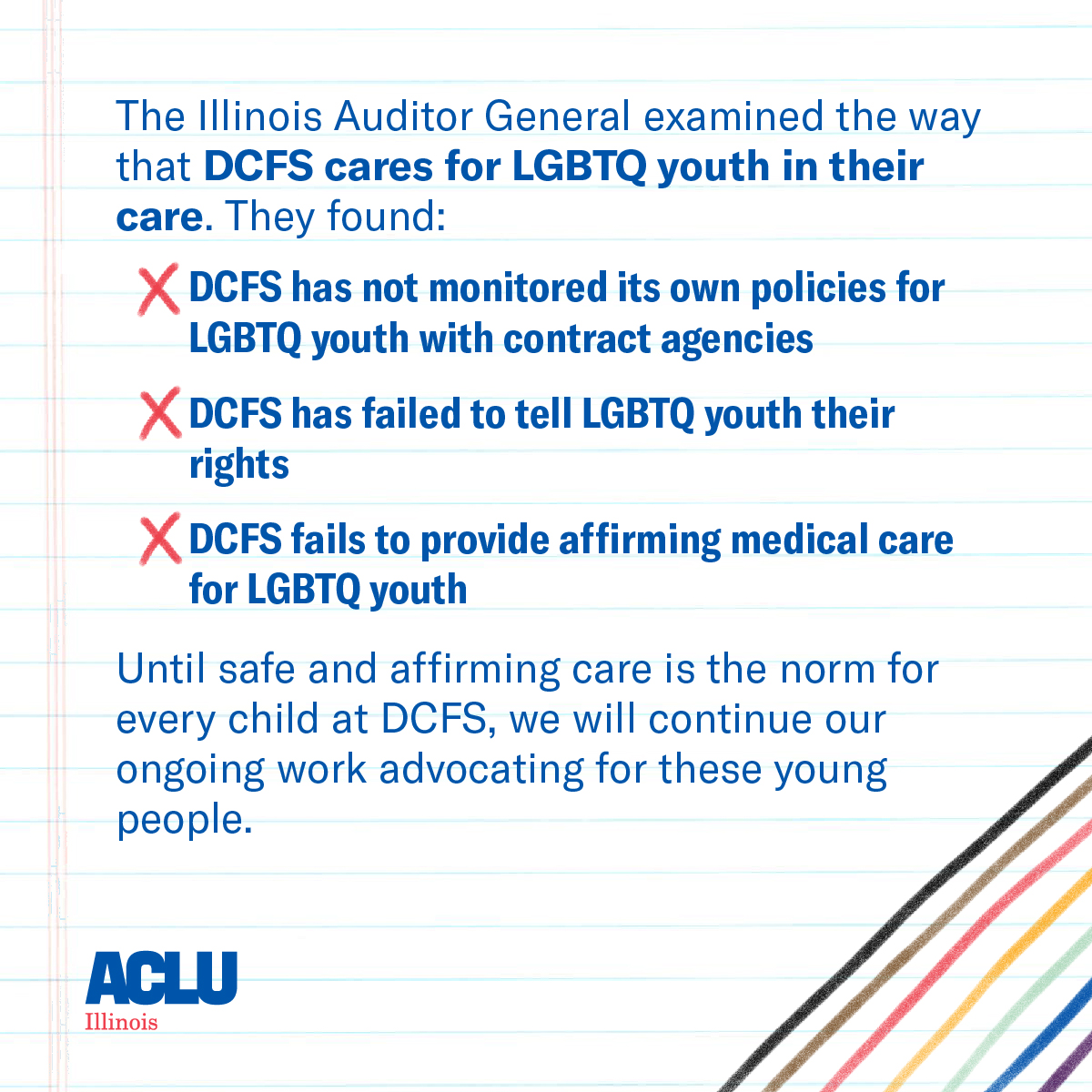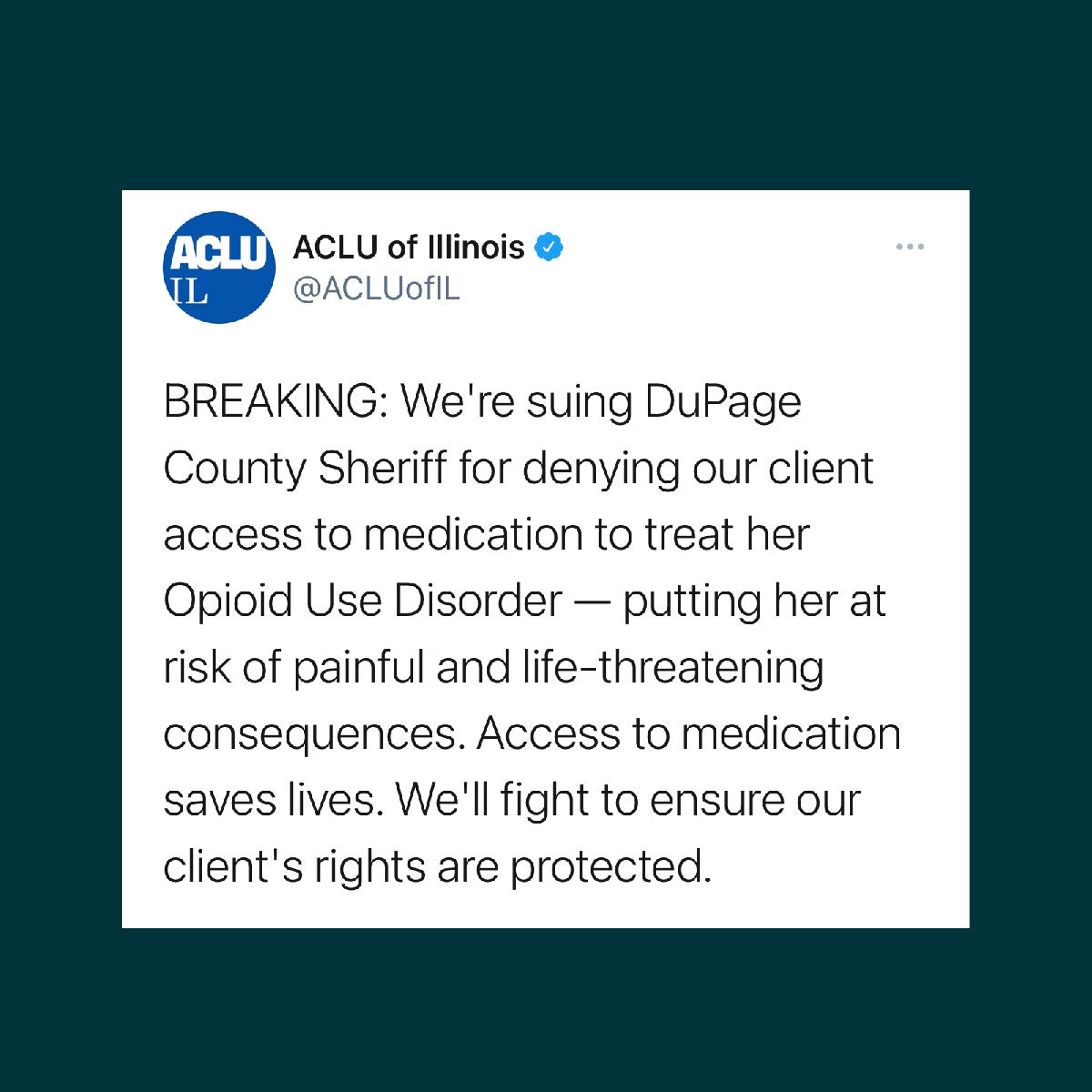A woman diagnosed with opioid use disorder (OUD) is at risk of painful and life-threatening consequences if she is denied medically necessary, physician-prescribed methadone during an upcoming incarceration at DuPage County Jail. The American Civil Liberties Union, the ACLU of Illinois, Legal Action Center, and the Roderick and Solange MacArthur Justice Center today filed a preliminary injunction in a lawsuit against the DuPage County Sheriff on behalf of Christine Finnigan to ensure she’s provided with her prescribed medication for addiction treatment (also known as MAT) while she is serving time on a February 2016 DUI.
DuPage County is alleged to have an unwritten policy that forces detainees to go through withdrawal, specifically refusing to confirm a plan for people facing imminent incarceration to be medically treated with methadone or another MAT medication known as buprenorphine. Other corrections facilities – including the nearby Cook County jail – provide these medications.
“I am horrified and afraid of going through detox while in jail,” said Ms. Finnigan. “I have gone through detox before without medication and know the pain and trauma. I nearly died. I just want to take the medication that has been prescribed for me.”
Ms. Finnigan was diagnosed with OUD in August 2019 and prescribed a daily methadone maintenance dose. This medical treatment is critical to her remaining alive. In 2016 she was charged with driving under the influence. She expects to serve 30 days in jail, starting February 25th.
“The opioid epidemic is ravaging our communities throughout the country, and jails and prisons are exacerbating the crisis by not allowing basic medication to treat opioid use disorder,” said Joey Longley, Equal Justice Works fellow at the ACLU’s National Prison Project. “Making sure that incarcerated people have access to Medication for Addiction Treatment (MAT) saves lives, with one study showing that it decreases mortality rates by as much as 74 percent. The tide is turning on this issue, and we look forward to the day that access to MAT is not up for debate.”
“The DuPage County Jail claims it supports addiction treatment but, in reality, it unjustifiably interferes with the life-saving treatment our client and others need,” said Rebekah Joab, staff attorney at the Legal Action Center. “DuPage’s practice is an example of the injustice that occurs when the criminal legal system inappropriately and dangerously derails someone’s health and recovery.”
“Opioid Use Disorder is a national public health crisis,” said Nusrat Choudhury, legal director at the ACLU of Illinois. “There were more than 2,000 opioid-related overdose deaths in Illinois just in 2019 alone. Medical experts make clear that medication treatment for addiction is standard practice. It is unnecessarily cruel that Ms. Finnigan and others are denied basic medication while at DuPage County Jail.”
“Nearly all Americans have been touched by the opioid crisis in some way,” said Maggie Filler, staff attorney at the Roderick and Solange MacArthur Justice Center, and a fellow with Northwestern Law School’s Bluhm Legal Clinic. “Too many lives have been lost and too many families destroyed for us to turn away from this crisis. It is a sad reality of the current criminal legal system that many people suffering from addiction will at one time or another spend time in a jail or prison. To really address this crisis, the full range of medically approved treatments must be made available in these settings. We hope that this lawsuit will be an important step in the right direction.”
Ms. Finnigan is asking a federal judge to issue an emergency order requiring the DuPage County Sheriff and other jail officials to ensure she has access to her medication.
The ACLU has filed similar litigation and won in Massachusetts and Maine. Additionally, the organization has filed similar litigation and settled after facilities agreed to provide MAT to its clients in Maine, Massachusetts, Washington, Kansas, and Montana.
A copy of the complaint can be found here.

